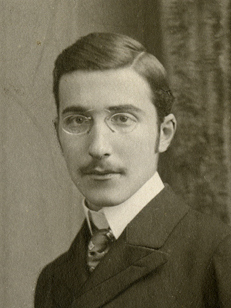Exeunt UK, Enter Europe

Stefan Zweig circa 1900.
The causes and consequences of the British exit are currently being pored over by every conceivable news organ, think tank, and political and economic institution. I don’t think I can add anything original to the torrents of analysis but can point to a good overview of the crisis and a piece that offers useful historical perspective [full disclosure: Mark Mazower was my doctoral thesis advisor].
However, as the Brexit news streamed out I looked to the newly translated book of essays by the great Austrian Jewish writer Stefan Zweig. His writing was from the precipice – Europe on the verge of war, at the onset of the Great Depression, during the fascist rise. Although pessimism born of exile got the better of him (how many more did the Nazis kill indirectly and remotely?), his writing during these moments of crisis always expressed an optimism in Europe, or his idea of a possible Europe. Zweig’s Europe was humane, heterogeneous, and cosmopolitan. His vision deserves to be recalled at moments like these. So, here are two quotations drawn from Messages from a Lost World. The first is from Zweig’s unfinished essay on European unity. The second is the epigraph of the anthology taken from Nietzsche.
For us who have found ourselves here reunited around an idea, I feel there is no longer a need to discuss the necessity and compelling logic of that idea, for to do so would simply be to waste time. All the leading heads of state, intellectuals, artists and scholars have been convinced for some time now that only a slender allegiance by all states to a superior governing body could relieve current economic difficulties, reduce the propensity for war and eliminate anxieties aroused by the threat of conflict, which are themselves one of the primary causes of the economic crisis. Our sole common task, then, is now to shift our ideas from the sphere of sterile discussion to one of creative action…The European idea is not a primary emotion like patriotism or ethnicity; it is not born of primitive instinct, but rather of perception; it is not the product of spontaneous fervor, but the slow-ripened fruit of a more elevated way of thinking. It entirely lacks the impassioned instinct which fuels patriotic feeling, and thus the sacro-egoism of nationalism will always cut more keenly through to the average man than the sacro-altruism of the European ideal, because it is always easier to be aware, through a spirit of devotion and veneration, of one’s own kind than of one’s neighbor.
Stefan Zweig, “The Unification of Europe: A Discourse” (1934)
Thanks to the pathological alienation which the nationalistic idiocy has established and still establishes among European peoples, thanks as well to the short-sighted politicians with hasty hands who are on top today with the help of this idiocy and have no sense of how the politics of disintegration which they carry on can necessarily only be politics for an intermission, thanks to all of this and to some things today which are quite impossible to utter, now the most unambiguous signs that Europe wants to become a unity are being overlooked or willfully and mendaciously reinterpreted.
Friedrich Nietzsche, Beyond Good and Evil (1886)
Amit, I love that you quote Stefan Zweig – it’s amazing to me how often these ‘ghosts’ from the past come back with striking relevancy…A sad life he had for sure…At first I was horrified by the vote but now I’m beginning to think that while the UK shrinks down to Little England, there’s a chance of it reinvigorating the EU and its supporters by clarifying the mission and opening the door to more honest discussions.
LikeLiked by 1 person
I love Stefan Zweig. Even though some of his writing was overly nostalgic, there was substance his claims about the positive features of the world he saw disappear. And yes, hopefully the response will be, “Enter Europe”!
LikeLike